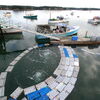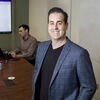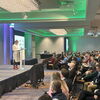The new class | Conversations with two of the four new presidents taking over Maine colleges this summer
On the occasion of so many fresh faces taking over institutions of higher education, Mainebiz decided to speak with two of these new leaders to discuss their new roles, and the directions they've set for their organizations. David Hales, a Texas native, took over as president of College of the Atlantic at the beginning of July, assuming a post occupied by Steve Katona since 1993. Hales has spent more than 30 years working in the field of environmental and sustainability policy, which he says fits nicely with COA's singular focus on what it calls "human ecology," or the way humans interact with their environment. Hales was deputy assistant secretary of the U.S. Department of the Interior during the Carter administration and director of the Global Environment Center of the U.S. Agency for International Development under President Bill Clinton. Most recently, he was counsel for sustainability policy at Washington, D.C.-based Worldwatch Institute, an independent research organization that focuses on the environment and sustainability issues.
Danielle Ripich also assumed her role as president of the University of New England at the beginning of July, replacing Sandra Featherman, who retired after 11 years. Ripich's experience primarily is in the medical field, having received a Ph.D. in speech pathology from Kent State University and spent much of her career conducting research at Case Western Reserve University in Cleveland. Along the way, she became an associate dean of the College of Arts and Sciences at Case Western Reserve, and arrived in Biddeford this summer from her position as dean of the College of Health Professions at the Medical University of South Carolina. Her involvement with medical research, and her experience as an administrator at a college of arts and sciences, she says, makes her a good fit for UNE, which offers an undergraduate liberal arts education while also being Maine's only medical school.
Edited transcripts of our conversations with Hales and Ripich follow.
David Hales
College of the Atlantic, Bar Harbor
Age: 61
Most recent job: Counsel for sustainability policy at the Washington, D.C.-based Worldwatch Institute
Other education experience: Samuel Trask Dana Chair of Natural Resources at the University of Michigan (1981-1987)
Mainebiz: Your predecessor, Steve Katona, had been with the school since 1972, and was president since 1993. Are there challenges coming in as an outsider and trying to fill the shoes of someone with that long tenure?
Hales: Well, I don't think it's my job to be another Ed Kaelber or another Lou Rabineau or another Steve Katona. The challenges they faced were unique to the institution's life at the time and to the world around them. Every opportunity that the college faces now is because of the hard work that the presidents and a lot of other people did, and so I think we are at a point where there are some opportunities available to us now, which weren't available six, eight, 10 years ago. And so my challenge is to help find those and take advantage of them, while at the same time ˆ and with searing focus ˆ paying attention to the quality of the undergraduate education we provide.
Have you been able to identify some of the new challenges COA faces in this phase of its life?
Let me characterize them as challenges, not necessarily new or old. The finances of all education institutions, particularly private education institutions, are an ongoing challenge.
And I think for us, in a very particular sense, there's the challenge to understand how our mission has both a global and local focus. One of the things that interested me most about COA is the value of this kind of school as a model for higher education in the 21st century. There are places where higher education is the avenue to the future ˆ maybe in every place that's true ˆ and yet neither Mombassa in Kenya or Charlevoix in northern Michigan or Bar Harbor in Maine are going to build another Harvard. That's just not going to happen. So the model for the 21st century seems to me to be one that we are an exemplary representative of, which is a very high-quality undergraduate education, world-class in its focus and its intensity, yet affordable to people who really can take that education and make a contribution to their communities.
COA is a small school with a tight focus ˆ a single degree in human ecology. Is that part of the educational model you are talking about?
I think it is. It's an interesting conundrum to me that the focus on human ecology lets us have a much broader, richer campus experience then if we had two or three different majors, but the people who were in those majors didn't talk to each other. There's a real serious core question here that deserves the attention of higher education, and that's the relationship between humans and the natural world that surrounds them. And our commitment is to look at that relationship from the point of view of the arts, from the point of view of economics, from the point of view of sociology, political science, the hard sciences. And yes, I think that is a model for the future. We'll find out. If we're useful to Maine, and if we're useful to Mount Desert Island, if we're a constructive member of our communities here, then maybe others will look at us and say something like COA could be a constructive part of our community.
COA has been an early adopter of many environmental practices over the years, from having a waste-free graduation to committing to use renewable energy. What does it take to stay ahead of the curve?
I think it starts with understanding your basic values as an institution and putting them into practice. And while it's good and green to have a carbon-free graduation or to commit to renewable energy, quite frankly it's great business for us, as well. Economically, colleges and universities all over this country are finding their budgets really challenged by the increasing costs of energy, for just one example. We and some others are well ahead of that curve in making a shift to a renewable economy. And if we can show how to do that in a way that makes sense to the bottom line, then those are some practical lessons that others on Mount Desert Island or Hancock County or elsewhere can learn from.
COA has its niche and attracts a certain kind of student, but how sustainable is the school? Are you concerned that COA's niche could either disappear or, on the flip side, become mainstream and force COA to compete with larger universities for those particular students?
No, I don't think so. I think the sustainability of our future is very much in our own hands. The more study there is in higher education of the ecological challenges that face us, the better for all of us. What's a real challenge for us, I think, is anticipating where societal challenges are going to come from and making sure that we're bringing to bear new ideas, new approaches, new solutions, new ways of thinking to those problems.
We're working very hard to expand our emphasis and focus on what many people call green business, or corporate responsibility, particularly from a sustainability perspective. How do we educate people as consumers? How do we educate teachers so that they go into secondary and primary schools and help people make smart choices in their own lives? How do we educate investors so they are looking at a triple bottom line, not just how much money they can get out in the short term?
So as times change and challenges change and globalization occurs, even though we're really small we've got an agility to move to the face of those issues. And I think our attractiveness to students will be more determined more by our ability to move in those directions with high quality educational opportunities than by any number of other schools being focused on the same thing.
You must have a lot of connections from your career in environmental and sustainability policy. Do you see that as an advantage in terms of fundraising or recruiting teachers?
I hope it's an advantage in terms of fundraising. I hope it's an advantage in terms of recruiting of faculty and speakers to campus. And I, like everybody else, intend to rely on my friends. I've been lucky enough to live a long time and I've kicked around enough that I have a fairly large Rolodex. And all of that is part of what the trustees were looking at when they asked me to take on this task.
Besides a stint as a professor of natural resources at the University of Michigan during the 1980s, though, you lack any experience in college administration or management. What challenges does that pose for you in your new role?
I thought about that a lot. I guess everyone who steps in as a chief executive officer of anything is always conscious of the things they wish they knew more about. We'd be kind of foolish if we didn't have a sense of our own weaknesses. But at the same time, it does seem to me that, given the nature of COA, it might be harder to take someone who had spent 40 years in a more mainline North American university and get them to fit into COA.
What are your goals at COA?
Let me start really global and cosmic with some big picture things, then I'll come back to some very mundane things, because to me they're all part and parcel of each other. My own belief is that we are facing an incredible time of crisis as societies, and I'm convinced that we are not ready either institutionally or philosophically for the challenges for the 21st century. There are different ways to address that, but one of the roles that is absolutely critical on both of those points is the role of higher education. I'm hopeful and committed to the idea that a school like College of the Atlantic, which focuses its attention on human ecology but takes into account all those other perspectives we talked about, has a very unique contribution to make.
At the same time, I want to balance our budget. I want to make sure that we have adequate housing for the students, that we hire the best faculty we can hire, that we pay them and the staff more than adequate salaries. There are some day-to-day things that I have to pay attention to so that others in the college community can address the broader issues.
A core part of the original vision and mission of this college was to contribute to the economy and culture of Mount Desert Island and Hancock County. And while on one hand I'm happy enough to have a discussion about climate change or a discussion about philosophy for the 21st century, if we're not relevant in our local community in very practical ways then we're not walking the walk, because sustainability ultimately is a local issue. So one of the real tests ˆ which I think this college has met very, very well over the years ˆ is to be an integrative part of its local community.
Danielle Ripich
University of New England, Biddeford
Age: 60
Most recent job: Dean of the College of Health Professions at the Medical University of South Carolina
Other education experience: Chair of the Department of Communication Sciences (1985-1994) and associate dean of the College of Arts and Sciences (1994-1999) at Case Western Reserve University in Cleveland
What attracted you to the University of New England?
I was in an academic medical center [in South Carolina], and I really missed the full university. I missed undergraduates; I missed the campus. The more I learned about the university, the more attracted I became to it. It's sort of like you don't think you want a dog, but you shouldn't go pick up the puppy because then you can't let it go. And University of New England is a unique university because it's private, yet it educates the most number of health professionals of any university in the state, which is usually a public charge that public universities tend to do.
The university's recent focus has been on expanding its medical research programs. How has research played into your career?
Case Western Reserve was a major research university, and I started there as an assistant professor. I had three NIH-funded, five-year grant projects that I worked on there. When I went to the medical university, the college there had about $500,000 a year in grant funding, and when I left about seven years later we were doing about $5 million a year.
How do expand research activity like that?
Early on when, you're trying to get research established, a lot of people take the "let a thousand flowers bloom" model, and you just try to help whoever is working to do research; you want to provide an environment that lets them blossom and do their work. I think we're kind of at the next level now, where we want to start to take a more strategic approach and decide that there are two or three things that we want to be known for that we can be very good in, and target our investment in those particular areas.
The university hasn't done a strategic plan for 10 years, so this fall we're embarking on this whole strategic planning process. This is almost like a research project; this is collecting the data, then we have to analyze all the data this fall and then hopefully by spring it'll be pretty clear to us what the direction should be for research.
There's also been talk of a new pharmacy school. Are there any new developments on that front?
It's a need. The workforce need in this region is important; it's only going to grow. I think it is something that we are best suited to provide for the state, because we can take our basic science faculty and then build on that and establish a really strong school of pharmacy. Where we do it and how we do it is still unclear, but a year from now I hope we are actually looking at recruiting students and getting ourselves started. So it's at the top of my list of things to do.
UNE is the only medical school in Maine, but it's also an undergraduate liberal arts college. What are the unique challenges in balancing the needs of those two very different entities?
Well, I think it is the healthiest environment because your faculty are teaching students at the very beginning of their college learning experience, and those students are often much more open and energized and excited about some of the things they are learning. On the other hand, you've got fourth-year medical students or doctor in physical therapy students who are advanced in their training and can actually help faculty on research projects. So as a faculty member I always thought it was the ideal because you have that whole range of learning and students to work with.
As an administrator, though, is it hard to balance the needs of the different types of schools?
I think so. While you have graduate students who need labs and researchers and those things, you have undergraduate students who need a quality of life and student life. So we're looking at how we can create an environment that gives students here enough to do outside class and creates a real campus for residential students that is going to be a rewarding experience.
You mentioned the new strategic plan in regards to research, but what other parts of the university need to be addressed?
I think on the academic side strengthening the programs that we have and the college of pharmacy, those are probably the two big academic challenges. I think then on the student life side, there is a whole issue of athletics and retention of male students. So, yes we have not just research challenges, we have academic challenges and student life issues that I think will be a large part of our strategic plan going forward.
Under your predecessor, Sandra Featherman, the school's enrollment increased by 1,400 and merged with Westbrook College, among other changes. Do you see that steady growth continuing?
I think we've decided that our undergraduate enrollment is at the maximum. It's at a point where we feel it allows us to really make all of our programs strong. As for our graduate programs, the workforce needs continue to be there, and hopefully we can grow the nursing program. One of our problems with our graduate health care programs is finding enough clinical training sites for our students, and that's one of the limiting factors. So one of my goals is really to grow our clinical placements and hopefully educate folks more about what having students can mean to them in certain sites around the state and region.
Do increases in tuition pose challenges for UNE?
I think private schools are used to doing a lot with a little. Students take on debt to go to school ˆ almost all of our students have loans ˆ and I take that responsibility very seriously. I came from a university where we had double-digit increases [in tuition] all seven years I was there. It was painful to watch because I knew that we were doing this in a way in which students were going to bear the burden. So it's something I'm very sensitive to and I think there are some better management strategies we can bring to bear to stretch our dollars even more.
Only 69% of Maine's graduating high school seniors in 2004 intended to enroll in college, according to Maine Compact for Higher Education. What can a private university do to encourage more students in Maine to go to college?
I think getting them to understand that although they take on debt to go to school, it is the best investment they can make. Return on that investment will pay back over the course of their entire career because their earning capacity goes up substantially with that degree ˆ especially in the health care field. In Maine, with an aging demographic, these are all people we're going to need. You can't outsource to India physical therapy, you have to do it here. So these are jobs that are going to stay here.










Comments